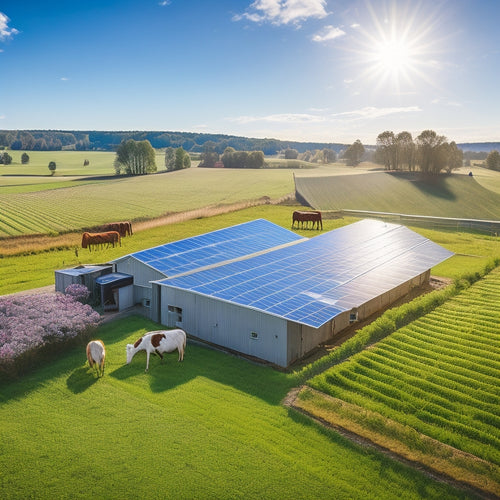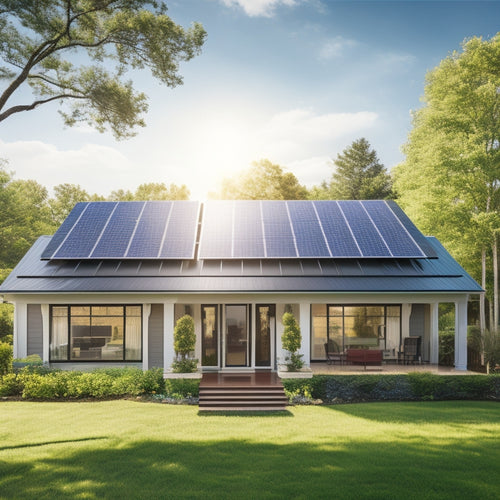
Asymmetrical Aesthetics Meet Solar Efficiency in Floating Shelves
Share
You can merge modern design with sustainable living by incorporating solar panels into asymmetrical floating shelves. This unique combination boosts energy harvesting efficiency by up to 25% while adding visual interest to your space. The asymmetrical design enables optimized storage, flexibility, and aesthetic appeal. By concealing the solar panels, you'll maintain a sleek, modern look while enjoying the benefits of renewable energy. As you explore this innovative concept, you'll discover how to balance style and sustainability, elevating your space to an eco-chic haven. Dive deeper into the world of solar-powered floating shelves and uncover the possibilities.
Key Takeaways
• Solar-powered asymmetrical floating shelves combine sustainable energy harvesting with modern design, redefining Energy Artistry.
• Innovative storage solutions with adaptable asymmetrical shelves optimize space utilization, creating visual interest and hiding wires.
• Sustainable design practices incorporate eco-friendly materials, natural lighting, and space planning to reduce energy consumption and promote green architecture.
• Technical insights into solar shelves involve optimizing photovoltaic cell efficiency, power optimization algorithms, and illumination intensity monitoring for maximum energy harvesting.
• The benefits of solar efficiency and minimal waste include reduced electricity costs, decreased carbon footprint, and enhanced sustainability, making it a unique and modern design solution.
Solar Power Meets Modern Design
As you explore the intersection of solar power and modern design, you'll discover a fascinating convergence of sustainability and style, where floating shelves play a pivotal role in maximizing energy harvesting while making a bold aesthetic statement.
This Design Philosophy revolutionizes the way we think about energy generation, integrating it seamlessly into our living spaces. Energy Artistry is redefined as functionality meets sleek, minimalist design.
The innovative use of floating shelves enables ideal solar panel placement, ensuring maximum energy output while maintaining a sleek, modern aesthetic. By merging form and function, you can harness the power of the sun while making a statement in your home's décor.
This synergy of style and sustainability is redefining the future of energy-efficient design.
Asymmetrical Shelves Redefine Storage
You'll find that asymmetrical floating shelves cleverly allocate storage space, effortlessly camouflaging unsightly wires and outlets while maintaining a visually striking, dynamic silhouette. This unconventional storage solution allows you to rethink your storage needs, creating a unique visual hierarchy in your space.
Here are some benefits of asymmetrical shelves:
-
Optimized storage: Make the most of your wall space with shelves that adapt to your needs.
-
Visual interest: Asymmetrical designs add a touch of modernity and sophistication to any room.
-
Flexibility: Easily rearrange your shelves to accommodate changing storage needs.
- Aesthetic appeal: Unconventional storage solutions create a striking visual hierarchy, drawing the eye upwards and creating a sense of depth.
Concealed Panels Boost Efficiency
Built into the shelving system, concealed panels cleverly integrate solar panels, harnessing natural light to power your devices and appliances while maintaining a sleek, modern aesthetic. You'll appreciate how seamlessly the panels blend into the shelves, creating a streamlined look.
This innovative design enables efficient energy harvesting, thanks to the strategic panel integration. As you plug in your devices, you'll enjoy the benefits of renewable energy, courtesy of the advanced energy dynamics at play.
With concealed panels, you can charge your gadgets while keeping your space clutter-free. By optimizing energy production and storage, you'll experience the perfect blend of form and function.
Sustainable Style for Modern Homes
As you design your modern home, you're likely considering sustainable style options that not only reduce your carbon footprint but also enhance your living space.
You'll want to explore eco-friendly design choices that incorporate recycled materials, energy-efficient features, and clever space planning.
Eco-Friendly Design Options
Incorporating eco-friendly design options into your modern home not only reduces your carbon footprint but also creates a sustainable style that's both functional and visually appealing.
As you begin your green architecture journey, consider the following sustainable materials for your floating shelves:
-
Reclaimed wood: Salvaged from old buildings, this wood reduces waste and adds a touch of history to your space.
-
Bamboo: A highly renewable resource, bamboo is lightweight, durable, and aesthetically pleasing.
-
Low-VOC paints: Guarantee a healthier indoor environment with paints that emit minimal volatile organic compounds.
- Recycled metal: Upcycle old metal into unique, eco-friendly shelf designs that tell a story.
Sustainable Space Planning
You can maximize your home's eco-friendly potential by optimizing room layouts to reduce energy consumption and promote natural lighting. By strategically placing furniture and fixtures, you can harness natural light and reduce the need for artificial lighting. This not only saves energy but also enhances the ambiance of your space.
In sustainable space planning, every detail matters. Consider the orientation of your windows, the placement of solar panels, and the flow of air circulation. By incorporating green architecture principles, you can create an eco-friendly haven that not only benefits the environment but also enhances your quality of life.
Embrace eco living by designing a space that harmoniously coexists with nature.
The Science Behind Solar Shelves
As you explore the science behind solar shelves, you'll discover the principles of energy harvesting that make these innovative fixtures possible.
You'll learn how photovoltaic cells convert sunlight into electrical energy, and how their efficiency is optimized to power your devices.
Energy Harvesting Principles
As you explore the science behind solar shelves, it's crucial to understand the energy harvesting principles that make them possible. Photovoltaic cells convert sunlight into electrical energy through a process known as photovoltaics, where semiconducting materials like silicon release electrons when exposed to photons.
To optimize energy conversion, you should consider the following key principles:
-
Maximum Power Point Tracking (MPPT): Guarantees efficient energy harvesting by tracking the maximum power point of the solar panel.
-
Energy conversion efficiency: Affects how much of the sun's energy is converted into usable power.
-
Power optimization algorithms: Enhance energy harvesting by adjusting parameters like voltage and current.
- Illumination intensity monitoring: Helps adjust energy harvesting strategies based on available sunlight.
Photovoltaic Cell Efficiency
Photovoltaic cells' efficiency hinges on their ability to convert sunlight into electrical energy, with silicon-based cells, the most common type, boasting an average efficiency of around 15-20%. You can optimize energy conversion by controlling cell temperature, which greatly impacts efficiency. As you design your floating shelves, consider the following factors that influence photovoltaic cell efficiency:
| Efficiency Factor | Description | Optimization Strategy |
|---|---|---|
| Cell Temperature | Higher temps reduce efficiency | Thermal imaging for heat management |
| Quantum Dots | Increase efficiency by 25% | Incorporate into silicon wafers |
| Voltage Optimization | Maximize energy output | Advanced power conditioning systems |
Bringing Eco-Chic to Your Space
You can effortlessly merge eco-friendliness with modern style by incorporating floating shelves with built-in solar panels, which not only boost your home's aesthetic appeal but also contribute to a sustainable future. This Space Revamp won't only make your space look modern and sleek, but also reduces your carbon footprint.
To bring eco-chic to your space, consider the following:
-
Eco-Friendly Accents: Add solar-powered decorative items to complement your floating shelves.
-
Sustainable Materials: Choose materials that are recyclable and sustainable for your shelves and decor.
-
Energy Efficiency: Optimize your space's energy consumption with energy-efficient lighting and appliances.
- Minimal Waste: Plan your design to minimize waste and reduce your environmental impact.
Frequently Asked Questions
Can Solar-Powered Shelves Be Installed Outdoors?
'Can you really expect your solar-powered shelves to withstand the elements? Yes, you can install them outdoors, as long as you select weather-resistant materials and guarantee proper outdoor placement to minimize environmental impact.'
How Do I Clean the Solar Panels on My Shelves?
You'll want to gently wipe your solar panels with a soft cloth and mild soap to remove dust accumulation, taking care not to compromise their water resistance, ensuring peak energy harvesting and shelf performance.
Are Asymmetrical Shelves More Expensive Than Traditional Ones?
You'll find that asymmetrical shelves often come with design tradeoffs, which can drive up Material costs, making them more expensive than traditional ones, but the unique look might be worth the extra cost to you.
Can I Customize the Design of My Solar-Powered Shelves?
You can customize your solar-powered shelves to fit your unique style, enjoying design freedom with a wide range of aesthetic options, from sleek modern to rustic, ensuring your eco-friendly storage solution reflects your personal taste.
Do Solar-Powered Shelves Require Special Maintenance?
Coincidentally, you're wondering about maintenance just as your solar-powered shelves are installed! Rest assured, you'll only need to perform routine battery checks and occasional energy audits to guarantee peak performance and efficiency.
Related Posts
-

What Do I Need to Know About Farm Solar Panels
When considering farm solar panels, you need to assess costs, benefits, and technical specifics. Initial investment c...
-

Essential Hiking Lights for Safety and Fun
When you're hitting the trails, essential hiking lights are vital for safety and fun. A lightweight headlamp offers h...
-

Home Solar Installation Cost
You're considering installing solar panels on your home, and the upfront cost is likely the biggest hurdle standing i...


